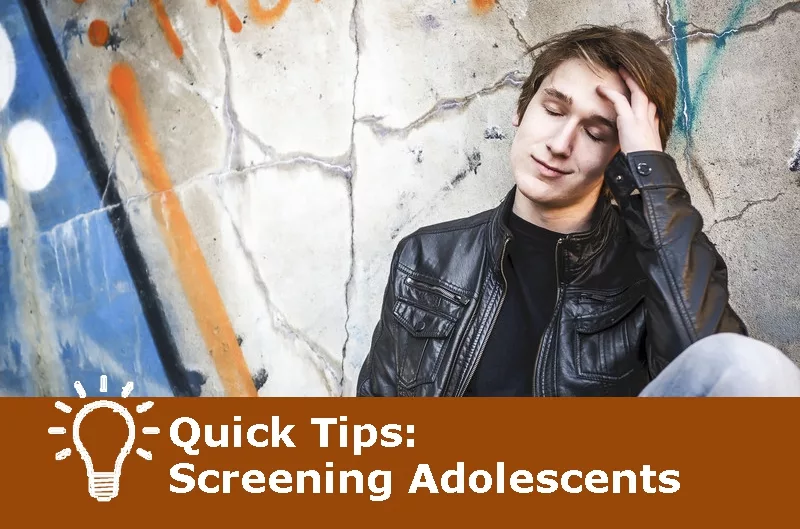Adolescents are generally healthy, and they don’t tend to present with pancreatitis or other adult diseases that can be possible clues to a substance use issue. A lot of times adolescents with SUDs don’t hit the surface until they have a legal or a school consequence.
The following is some advice on screening adolescents for SUDs from Joanna Quigley, MD, Associate Medical Director for Child and Adolescent Ambulatory Services at the University of Michigan, who we interviewed on the topic in the July/August issue of The Carlat Addiction Treatment Report:
Make use of screening tools
The electronic Screening to Brief Intervention (S2BI) looks at frequency of use. It screens for nicotine and tobacco, alcohol, marijuana, and others. The CRAFFT is also a great tool in general child psychiatry and addiction treatment practices. NIAAA also has a two-question test that looks at use.
Ask the right screening questions
Be very specific in your questions. Don’t just ask, “Do you smoke?” Ask, “Are you using any nicotine products? What are you using in your vape?” Adolescents are also adjusting the contents of some of these vape products to include cannabidiols and increasing the levels of nicotine.
For a specific medication, ask, “Have you ever found yourself taking more than you’re prescribed and how did that make you feel?” Ask substance-specific questions and very specific impairment questions such as, “How often are you thinking about using?” “Do you find yourself not getting as high as you used to?”
Consider motivational interviewing
Use motivational interviewing (MI) techniques while engaging around why they’re still using. For example, if it’s cannabis, find out what role the cannabis is playing in their lives. Oftentimes, we’ll discover there may be concurrent anxiety or an untreated mood disorder.
In utilizing MI, try to ask general questions to gauge their engagement with drugs and their beliefs. For example: “Your parents seem to be really worried about your substance use, what do you think about that?” Additionally, you could ask questions such as, “You state that you have researched a lot about cannabis and believe that its risks are overrated. Do you think there’s any evidence that your cannabis use has had a negative impact on your day to day life?”
Want to read the full Q&A? Click here. (Full article is available to The Carlat Addiction Treatment Report subscribers. Not a subscriber? Join here.)
The following is some advice on screening adolescents for SUDs from Joanna Quigley, MD, Associate Medical Director for Child and Adolescent Ambulatory Services at the University of Michigan, who we interviewed on the topic in the July/August issue of The Carlat Addiction Treatment Report:
Make use of screening tools
The electronic Screening to Brief Intervention (S2BI) looks at frequency of use. It screens for nicotine and tobacco, alcohol, marijuana, and others. The CRAFFT is also a great tool in general child psychiatry and addiction treatment practices. NIAAA also has a two-question test that looks at use.
Ask the right screening questions
Be very specific in your questions. Don’t just ask, “Do you smoke?” Ask, “Are you using any nicotine products? What are you using in your vape?” Adolescents are also adjusting the contents of some of these vape products to include cannabidiols and increasing the levels of nicotine.
For a specific medication, ask, “Have you ever found yourself taking more than you’re prescribed and how did that make you feel?” Ask substance-specific questions and very specific impairment questions such as, “How often are you thinking about using?” “Do you find yourself not getting as high as you used to?”
Consider motivational interviewing
Use motivational interviewing (MI) techniques while engaging around why they’re still using. For example, if it’s cannabis, find out what role the cannabis is playing in their lives. Oftentimes, we’ll discover there may be concurrent anxiety or an untreated mood disorder.
In utilizing MI, try to ask general questions to gauge their engagement with drugs and their beliefs. For example: “Your parents seem to be really worried about your substance use, what do you think about that?” Additionally, you could ask questions such as, “You state that you have researched a lot about cannabis and believe that its risks are overrated. Do you think there’s any evidence that your cannabis use has had a negative impact on your day to day life?”
Want to read the full Q&A? Click here. (Full article is available to The Carlat Addiction Treatment Report subscribers. Not a subscriber? Join here.)


_-The-Breakthrough-Antipsychotic-That-Could-Change-Everything.webp?t=1729528747)



